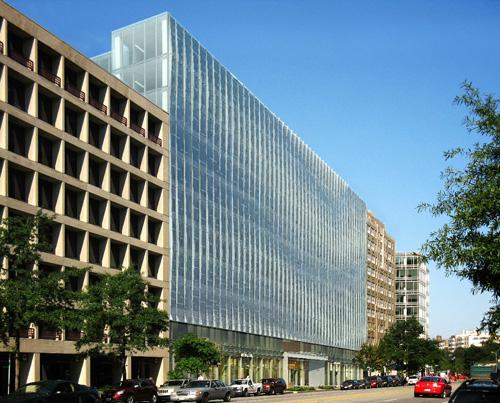
This post was written by Hatchet staff writer Danielle Telson.
The University released detailed plans Friday for a new office building on Pennsylvania Avenue that will replace a cluster of townhouses and commercial space.
The detailed designs filed with the D.C. Office of Zoning bring GW a step closer to tearing down an office at 2100 W Pennsylvania Ave. and two neighboring University buildings, as well as Froggy Bottom Pub, Thai Place, Panda Café and Mehran Restaurant.
Sara Bardin, director of the D.C Office of Zoning, said the project is being referred to the city’s Office of Planning for review this week. GW must receive a green light from the zoning commission to move forward with the site’s development.
Developer selection for the sleek 255,550-square foot office building will begin in mid-2013, according to the documents. Construction is estimated begin in early 2014 and last 24 months.
The building will include sustainable features, like a green roof, and will collect rainfall. It will also include 183 below-ground parking spaces and 50 bicycle spots.
The project follows a model similar to that of The Avenue – redeveloping a property for commercial use to draw in more revenue for the University’s academic programs, facilities and financial aid. A price tag has not yet been determined, University spokeswoman Michelle Sherrard said, adding that costs are typically calculated after meeting with a developer.
GW first announced plans to demolish buildings along the block in November, after learning that health care center Kaiser Permanente, the tenant at 2100 W Pennsylvania Ave., plans to relocate in late 2012. The 2007 Campus Plan outlined future demolition of the townhouses but the University must gain approval from the zoning commission to redevelop the building where Kaiser Permanente operates.
Alumnus and Foggy Bottom and West End Advisory Neighborhood Commissioner Asher Corson railed against the project then, calling the commercial property a profit-maker that strays from GW’s academic mission.
He suggested the commission bring on legal counsel to evaluate GW’s development projects, a request that led the group to allocate $2,000 at its February meeting to hire an attorney specializing in zoning laws.
“I can remember as a student I had classes throughout every year when I was a student at GW that were blocks and blocks off campus,” Corson said. “The student health center is off campus still. Here is a major building on campus and instead of using it for the needed classroom space and instead of using it to house a student health center, which I would say should be on campus for the sake of the student body, GW is going to go and use this property to make money.”
Corson said the redevelopment of the block would eliminate several affordable neighborhood restaurants and the University should seek out dining options that are low-cost – on which young professionals and retired individuals in the area rely – when the building is erected.
Sherrard said GW is committed to maintaining a positive relationship with neighbors.
“The process of engaging with nearby building tenants and the community has begun and will continue throughout the planning process,” she said.




